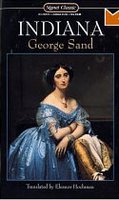Sand, George. Indiana (1832). New York: Signet Classics, 1993.
 French novels!
French novels!In this one, Indiana is a woman born and raised on Reunion Island (off the coast of Madagascar) who now lives in France and is married to a brute. He's a man who kills dogs in anger, that sort of thing. (At least two dogs die in this book, one of them being bludgeoned in the head with an oar and left to drown. Very brutal.)
She also lives with her cousin, Ralph, and her maid/adoptive sister, Noun. Well, it turns out that Noun has caught the eye of a local aristocrat named Raymon, and they've been having an affair. Over time, though, Raymon spends a lot of nights in "society" and grows to fall out of love with Noun. In fact, he begins to fall in love with Indiana, whom he meets at a ball. Noun feels that his love has waned and writes him a letter. Disclosed therein: she's pregnant with his baby. She pleads with him to come to the house she lives in (Indiana's house) so they can talk about it.
Raymon arrives, thinking he'll give her money and make her go away. When he gets there, he sees that she's dressed as Indiana, and she proceeds to lure Raymon up to Indiana's room. They drink and fight, and in the heady confusion of it all, they fuck right on Indiana's bed.
Oh, she's out for the weekend or something.
The next day, Raymon wakes and finds the door locked from the outside. Noun is keeping him for later. But Indiana, of course, comes home early, and Noun is forced to hide Raymon behind the drapes. He's uncovered, eventually, and Indiana (who has known for his increasing love for her), asks if he'd go so far as to break into her bedroom. Such gall! Noun, hearing that Raymon has indeed professed love for her mistress/sister, runs out of the room. Raymon is banished in disgust.
The next morning, Noun's body is found floating in the lake.
And all this in just the first 50 pages!
Les romans Française!








